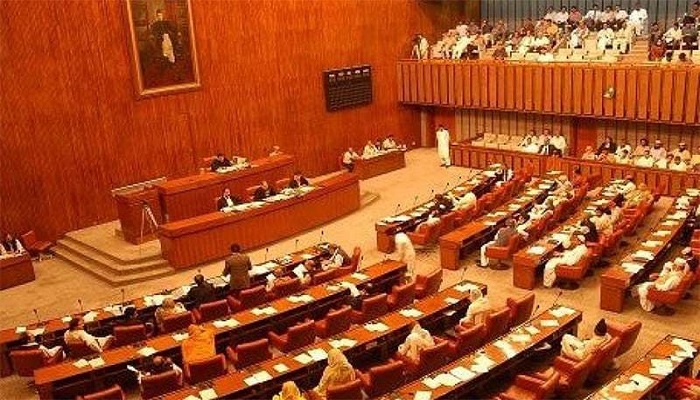Senate passes SC bill clipping CJP wings amid opposition's protest
Bill passed by a majority, with 60 votes in favour and 19 against
The Senate passed the Supreme Court (Practice and Procedure) Bill 2023 that clips the powers of the chief justice amid protest by the Opposition on Thursday.
The bill was moved in the Senate today after it was approved by the National Assembly a day earlier. At least 60 senators approved the bill while 19 lawmakers voted against it.
Before the final vote on the bill, a motion was presented to send the bill to the Senate Standing Committee on Law and Justice for further debate but it was rejected. The motion for the urgent approval of the bill was then presented which was accepted by a majority of lawmakers.
Once the bill was tabled in the Senate, Law Minister Azam Nazir Tarar explained that the proposed law is providing the right to appeal in suo motu cases and to appoint a different lawyer in the appeals.
However, Leader of the Opposition Dr Shahzad Waseem slammed the bill saying that the government is unable to ensure a smooth distribution of wheat and planning to make rules for the Supreme Court.
“Making rules for the Supreme Court is an indirect attack (on the judiciary. You are trying to create division in the Supreme Court,” claimed Dr Waseem. He added that the bill did not talk about the right of appeal before and later in the standing committee the right to appeal was also given on previous cases.
“Give the bill to the committee and let it bring its changes,” said the Pakistan Tehreek-e-Insaf (PTI) senator and called for a vote on the matter.
As the opposition leader was making his speech, the PTI senators hold a protest in the upper house.
When PTI Senator Ali Zafar was given a chance to speak, he said that he had two objections to the bill.
“Only constitutional amendment can be made in 184/3. If you pass laws this way then it will be struck down within 15 days,” warned the senator. He added that the right to appeal can only be given through the Constitution.
Zafar said that the Senate’s standing committee had sent a constitutional amendment for the right to appeal. He also warned that by opening past cases the Supreme Court will have to hear thousands of cases again.
“There is also a divide among the lawyers on this bill. Such amendments cannot be made without amending the Constitution,” said Zafar. He added that some changes suggested by the bill are illegal.
The senator also objected to the timing of the bill as that an election suo motu was ongoing in the Supreme Court.
NA passes bill to clip CJP’s suo motu powers
A day earlier, in a bid to bolster checks and balances in the higher judiciary, the National Assembly passed the Supreme Court (Practice and Procedure) Bill, 2023, tabled to limit Pakistan's top judge's discretionary powers to take suo motu notice.
The bill was passed hours after National Assembly Standing Committee on Law and Justice gave its consent.
The bill was moved by the government after two Supreme Court judges — Justice Syed Mansoor Ali Shah and Justice Jamal Khan Mandokhail — raised questions over the powers of the chief justice of Pakistan (CJP), saying the apex court “cannot be dependent on the solitary decision of one man, the Chief Justice”.
The bill
The bill includes shifting the powers of taking suo motu notice from the chief justice to a three-member committee comprising senior judges.
Moreover, the bill also includes a clause regarding the right of challenging the decision which could be filed within 30 days and will then be fixed for a hearing in two weeks.
According to the bill — a copy of which was seen by Geo News — every clause, appeal or matter before the Supreme Court shall be heard and disposed of by a bench constituted by the committee comprising the CJP and two senior judges, in order of seniority.
The bill also mentioned that the decision of the committee shall be by the majority.
It was also mentioned in the bill that any matter invoking the exercise of original jurisdiction under clause (3) of Article 184 of the Constitution shall be placed before the committee constituted under section 2 for examination and if the committee is of the view that a question of public importance with reference to enforcement of any of the fundamental rights conferred by Chapter I of Part II of the constitution is involved, it shall constitute a bench comprising not less than three judges of the Supreme Court which may also include the members of the committee, for adjudication of the matter.
Meanwhile, in matters where interpretation of the constitutional provision is involved, the committee shall constitute a bench comprising not less than five judges of the apex court.
The bill also grants the party the to appoint counsel of its choice for filing a review application under Article 188 of the Constitution. It should be noted that the counsel, for this purpose, shall mean an advocate of the Supreme Court.
“An application pleading urgency or seeking interim relief, filed in a cause, appeal or matter, shall be fixed for hearing within fourteen days from the date of its filing,” the bill read.
-
Security forces gun down 30 terrorists in multiple IBOs in KP: ISPR
-
MQM-P calls for new province in Sindh
-
US report validates Pakistan military edge over India: PM
-
Banned TTP poses serious threat to Pakistan security: UNSC panel
-
CM Afridi clarifies remarks on by-poll after ECP requests army deployment
-
Dubai sees 3.2m Pakistani passengers in 2025 as airport sets new milestone
-
Security forces kill 23 Indian proxy terrorists in KP's Kurram
-
Pakistan to construct island to boost oil exploration: report












